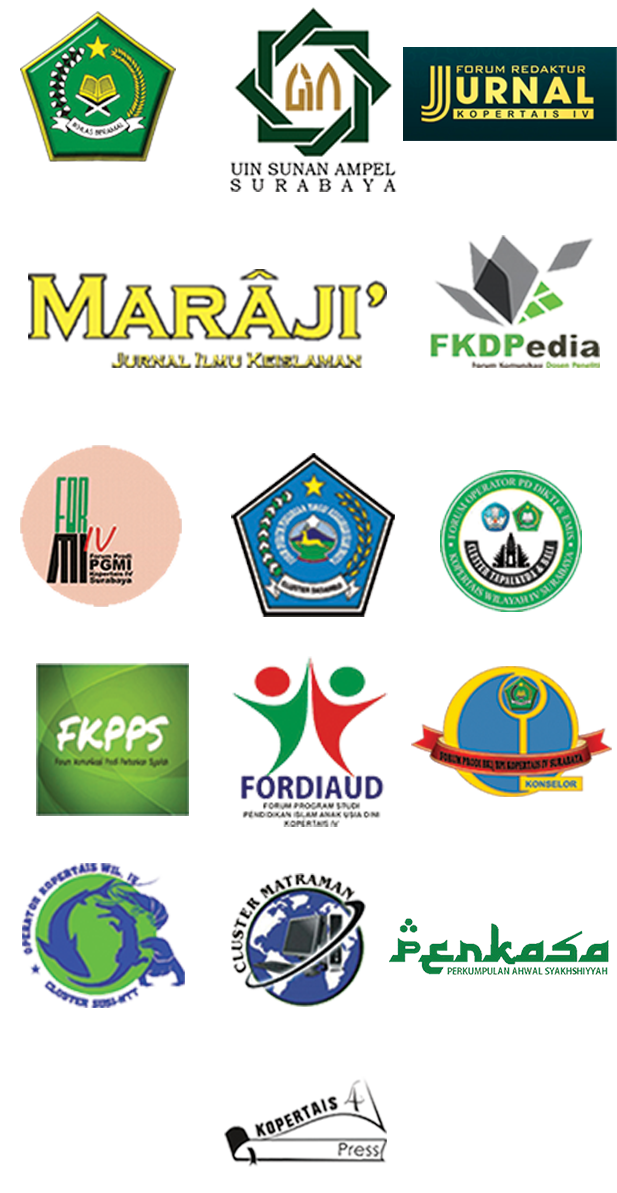Menggali Perangkat Keilmuan Islam sebagai Basis Pengembangan Nilai-Nilai Universal Penalaran Moral Post-Conventional
Abstract
Post-conventional is the highest level of moral reasoning based on cognitive developmental moral theory. As the highest level, post-conventional is the level of moral reasoning that everyone (including Muslims) needs to have because a person's moral reasoning is correlated with his moral actions. Moral reasoning affects how a person believes that behavior should be done. A person has reached the post-conventional level if his moral reasoning refers to universal values such as justice, equality, humanity, and so on. In Muslim society, the acceptance of universal values that form the basis for this post-conventional level of moral reasoning is still debated. This article examines the thoughts of Muslim scholars who present explanations of Islamic scientific tools (maqashid al-shariah, maslahah, and naskh-mansukh), which give place to universal principles. The results of this study conclude that a Muslim has the opportunity to reach a post-conventional moral level because his religious teachings provide a foundation based on universal values as well as a post-conventional moral level foundation. Based on the results of this study, Islamic education can use the reference of cognitive-developmental moral theory to be used in the formation of students' moral reasoning to the highest level; post-conventional.
Downloads
References
Al-Qur’an al-Karim
Abou El Fadl, K. (2017). Qurʾanic Ethics and Islamic Law. Journal of Islamic Ethics, 1(1–2), 7–28. https://doi.org/10.1163/24685542-12340002
Anonim. (n.d.). Post-Conventional Level. Retrieved from https://www.alleydog.com/glossary/definition.php?term=Postconventional+Level
Armon, C., & Dawson, T. L. (1997). Developmental trajectories in moral reasoning across the life span. Journal of Moral Education, 26(4), 433–453. https://doi.org/10.1080/0305724970260404
Colby, A., Kohlberg, L., Abrahami, A., Gibbs, J., & Higgins, A. (2011). The measurement of moral judgment. Volume I, Theoretical foundation and research validation. New York: Cambridge University Press.
Duska, R., & Whelan, M. (1975). Moral Development; A Guide to Piaget and Kohlberg. New York: Paulist Press.
Fang, Z., Jung, W. H., Korczykowski, M., Luo, L., Prehn, K., Xu, S., … Rao, H. (2017). Post-conventional moral reasoning is associated with increased ventral striatal activity at rest and during task. Scientific Reports, 7(1), 1–11. https://doi.org/10.1038/s41598-017-07115-w
Firdaus, R. (2011). Konsep Maslahat di Tengah Budaya Hukum Indonesia. Jurnal AlManahij, 5(1).
Green, A., & Snarey, J. (2011). Postconventional Morality. In S. Goldstein & J. A. Naglieri (Eds.), Encyclopedia of Child Behavior and Development. https://doi.org/https://doi.org/10.1007/978-0-387-79061-9
Hilmy, M. (2016). Pendidikan Islam dan Tradisi Ilmiah. Malang: Madani.
Karpiak, C. P., & Baril, G. L. (2008). Moral reasoning and concern for the environment. Journal of Environmental Psychology, 28(3), 203–208. https://doi.org/10.1016/j.jenvp.2007.12.001
Kim, H. (2006). Religious Education : The official journal of the Religious Education Association Educating in a Postconventional Society. (October 2014), 37–41. https://doi.org/10.1080/00344080600948597
Kohlberg, L. (1968). The child as a moral philosopher. The Psychology Today, 7, 23–30.
Kohlberg, L. (1972). A Cognitive-Developmental Approach to Moral Education. Humanist, 32(6), 13–16.
Kohlberg, L. (1980). Stages of Moral Development as a Basis of Moral Education. In B. Munsey (Ed.), Moral Development, Moral Education, and Kohlberg (pp. 15–98). Birmingham, Alabama: Religious Education Press.
Kohlberg, L. (1995). Tahap-Tahap Perkembangan Moral. Yogyakarta: Kanisius.
Latif, D. A. (2000). The relationship between pharmacy students’ locus of control, machiavellianism, and moral reasoning. American Journal of Pharmaceutical Education, 64(1), 33–37.
Moreno, R. (2010). Educational Psychology. New Jersey: John Wiley & Sons.
Naim, A. A. A. (1997). Dekonstruksi Syariah: Wacana Kebebasan Sipil, Hak Asasi Manusia Dan Hubungan Internasional Dalam Islam. Yogyakarta: Lkis.
Narvaez, D. (2008). Human Flourashing and Moral Development. In L. P. Nucci & D. Narvaez (Eds.), Handbook of Moral and Character Education (pp. 310–327). New York: Routledge.
Nasseri, I., Ahmed, R., & Tatari, M. (2018). Editor’s Introduction. In I. Nasseri, R. Ahmed, & M. Tatari (Eds.), The Objectives of Islamic Law: The Promises and Challenges of the Maqashid al-Sharia (pp. 1–2). Lanham-Maryland,: Lexington Books.
Opwis, F. (2005). Maslaha in Contemporary Islamic Legal Theory. Islamic Law and Society, 12(2), 182–223. https://doi.org/10.1163/1568519054093699
Opwis, F. (2017). New Trends in Islamic Legal Theory: Maqāṣid al-Sharīʿa as a New Source of Law? . Die Welt Des Islams, 57(1), 7–32. https://doi.org/10.1163/15700607-00571p03
Power, D. (1975). Moral Education for Postconventional Thinking. Journal of Moral Education, 4(2), 111–116. https://doi.org/10.1080/0305724750040204
Power, F. C. (2008). Moral Reasoning. In F. C. Power (Ed.), Moral Education; A Handbook, Volumes 1&2. Westport-CT: Praeger.
Rest, J. R. (1992). Komponen-Komponen Utama Moralitas. In W. M. Kurtines & J. L. Gerwitz (Eds.), Moralitas, Perilaku Moral, dan Perkembangan Moral. Jakarta: UI Press.
Saeed, A. (2018). Human Rights and Islam: An Introduction to Key Debates between Islamic Law and International Human Rights Law. Cheltenhem, Northampton: Edward Elgar Publishing.
Santo, J. de. (1995). Kata Pendahuluan. In L. Kohlberg (Ed.), Tahap-Tahap Perkembangan Moral. Yogyakarta: Kanisius.
Sham, F. M., Yaqin, A., & Wachidah, H. N. (2021). Moral Reasoning Theory : Between Kohlberg ’ s and al-Ghazali ’ s Perspective. 20, 25–33. https://doi.org/https://doi.org/10.24035/ijit.20.2021.207
Sonnert, G., & Commons, M. L. (1994). Society and the highest stages of moral development. Politics and the Individual, 4(1), 31–55.
Syarifuddin, A. (1999). Usul Fikih 2. Jakarta: Logos Wacana Ilmu.
Wahid, A. (1995). Universalisme Islam dan Kosmopolitanisme Peradaban Islam. In B. M. Rachman (Ed.), Konstekstualisasi Doktrin Islam Dalam Sejarah (p. 545). Jakarta: Paramadina.
Yaqin, A. (2019). Developing Moral Reasoning Theory Based on Islamic Education Perspective. Advances in Social Science, Education and Humanities Research, 387(Icei), 55–61. https://doi.org/10.2991/icei-19.2019.13
Yaqin, A. (2020). Pendidikan Akhlak-Moral Berbasis Teori Kognitif. Depok: Rajawali Press.
Zed, M. (2014). Metode Penelitian Kepustakaan. Jakarta: Yayasan Pustaka Obor Indonesia.
https://www.alleydog.com/glossary/definition.php?term=Postconventional+Level disitasi tanggal 20 Juli 2018.
Douglas Hawks, Moral Development and Lawrence Kohlberg, disitasi dari https://study.com/academy/lesson/postconventional-morality-definition-lesson-quiz.html tanggal 20 Juli 2018
Copyright (c) 2022 Ainul Yaqin

This work is licensed under a Creative Commons Attribution-ShareAlike 4.0 International License.









